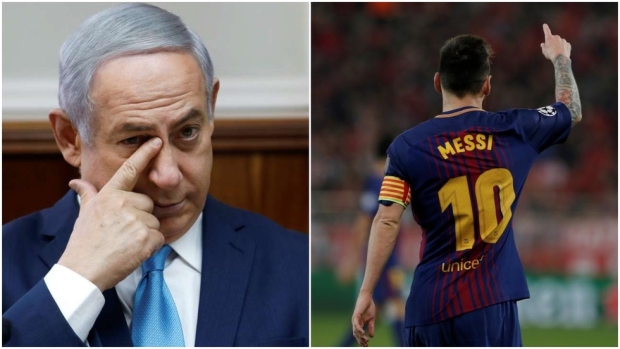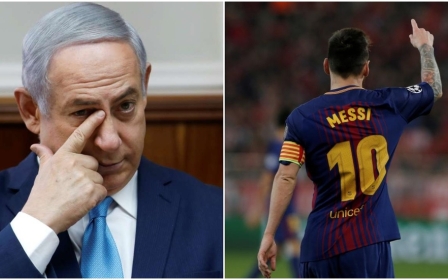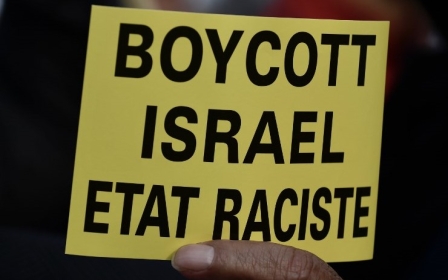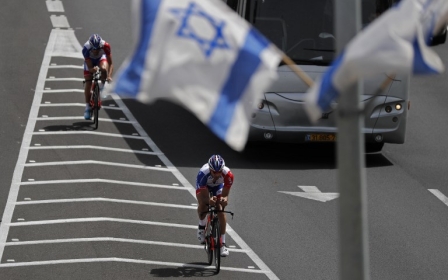Israel's goal for Messi to play in Holy City was bound to backfire
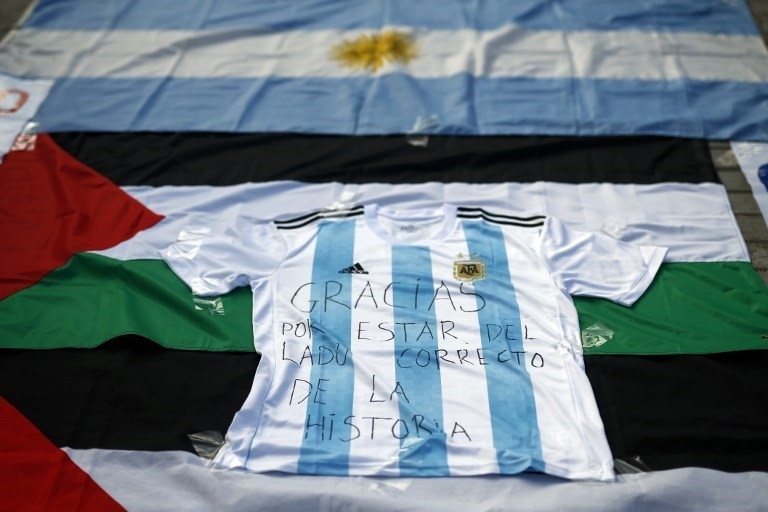
The strong criticism and protest that led to the cancellation of a planned football match between Argentina and Israel, which was due to take place in a city half of which is considered illegally occupied under international law, should come as little surprise.
Even less surprising is that the Israeli government would seek to co-opt a friendly game of football for political legitimacy.
Sport and politics
The biggest surprise, however, is that it was Argentina, with its past, which found itself in this position. It should know better than most nations how easily a sports event can be used for political gain and how dangerous that can be.
Whether we like it or not, sport and politics are often inextricably linked. Just like art and culture, sport is ultimately a tool for human expression which can, at times, unify and transcend politics.
The notion that sport could momentarily bring together, in a very literal sense, warring factions, and pierce through bitter enmity is a powerful and romantic one
Perhaps the most famous example of this is the “Christmas Truce" football match between English and German soldiers during the First World War. An English corporal of the Seaforth Highlanders who was present for this game later recounted: "We were laughing and chatting to men whom only a few hours before we were trying to kill."
Understandably, the notion that sport could momentarily bring together, in a very literal sense, warring factions, and pierce through bitter enmity is a powerful and romantic one.
Conversely, sport can also be co-opted and used to project political agendas, whether symbolically, as a soft-power tool or an outright propaganda effort. Often those who argue that sport and politics are completely separate and should not mix are the ones who are subtly profiting politically from sport.
Argentina's 'dirty war'
Argentina should know this better than most. The 1978 FIFA World Cup, staged in Argentina, has been likened by some commentators to the manipulation of the 1936 Berlin Olympics, which was "co-opted as a perverse paean to Hitler's Nazi ideology".
At the time, the footballers themselves might not have realised how their participation in a sporting tournament provided cover for the Argentine President General Jorge Rafael Videla's campaign of suppression and human rights abuses, known as Argentina's ‘Dirty War’.
The Argentine national team had been due to face Israel in their final World Cup preparation game, before they head to this year's tournament in Russia. With the global profile of the Argentine players, this provided powerful political symbolism for the image which Israel wishes to project of itself globally.
In purely sporting terms, choosing Israel as an opponent to prepare for a World Cup group, which also includes Croatia, Iceland and Nigeria, was an odd decision for Argentina
In purely sporting terms, choosing Israel as an opponent to prepare for a World Cup group, which also includes Croatia, Iceland and Nigeria, was an odd decision for Argentina. It is out of keeping with how other national teams have traditionally prepared for participation in a World Cup, and frankly makes no sense.
A shaky rationale
The admittedly rather unscientific logic behind arranging pre-World Cup friendlies is simply based on countries choosing their friendly opponents based purely upon geographical proximity to their group stage opponents. For example, Croatia's preparation for facing Argentina was to play Brazil in a friendly on 3 June, and in preparation for the game against Nigeria, they will face Senegal on 8 June.
With that in mind, the fact that the Argentinian Football Association (FA) accepted the invitation to play in this game raises a number of awkward questions and opens them up to accusations of allowing themselves to be used politically by their hosts.
The sporting rationale for the game to take place at this point in time is incredibly shaky.
Uzi Dann, correspondent for Haaretz, wrote that the players and head coach themselves never wanted this game to go ahead nor wanted to leave their training camp in Barcelona to travel to Russia via Israel. "But money dazzles finer people than anyone in Argentine soccer," according to Dann.
In hindsight, it's evident that the Argentinian FA should feel embarrassed that they put commercial interests ahead of sporting ones, jeopardising the national team's preparations for the World Cup. However, they are also culpable of having poor political judgement and not learning the lessons from 1978.
Wrong place, wrong time
Although when the game was originally organised, it was planned to take place in Haifa, it is no surprise that the Israeli government could not resist the urge to co-opt the presence of global sporting superstars to bolster its political legitimacy on the global stage and "wash its face" after recent events in Gaza.
The Israeli culture and sports minister Miri Regev moved the game, at Israeli taxpayers' expense, to Jerusalem and marked the game as part of Israel's 70th birthday celebrations. But instead of getting Messi, she's presided over a mess.
In any case, many critics of Israel and sports fans alike will argue that given the recent killing of more than 100 Palestinians in weekly demonstrations launched on 30 March in the Gaza Strip, it was both the wrong place and the wrong time.
On hearing the news of the cancellation, one of the team’s star strikers, Gonzalo Higuain, told ESPN television network: “They've finally done the right thing... Rationale and health come before everything else. We think it's best not go to Israel."
Unlike the 1978 generation, this group of players were aware that they were being used politically and were not happy about it. Their strengths of feeling that not playing the game was the "right thing" should shame the Argentine football officials who organised the game in the first place.
- Mostafa Mohamed is a freelance Egyptian journalist who has worked as a correspondent for several Arab and international journals and magazines, writing on economics and sports.
The views expressed in this article belong to the author and do not necessarily reflect the editorial policy of Middle East Eye.
Photo: An Argentina national football team jersey with 'Thanks for being on the right side of history' written on it in Spanish (AFP)
New MEE newsletter: Jerusalem Dispatch
Sign up to get the latest insights and analysis on Israel-Palestine, alongside Turkey Unpacked and other MEE newsletters
Middle East Eye delivers independent and unrivalled coverage and analysis of the Middle East, North Africa and beyond. To learn more about republishing this content and the associated fees, please fill out this form. More about MEE can be found here.


